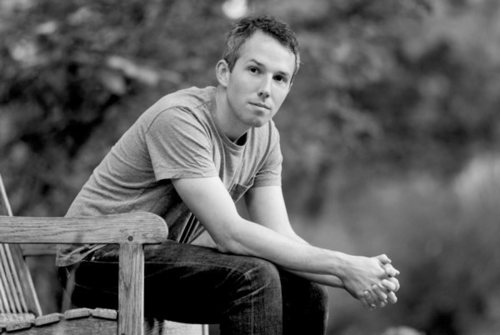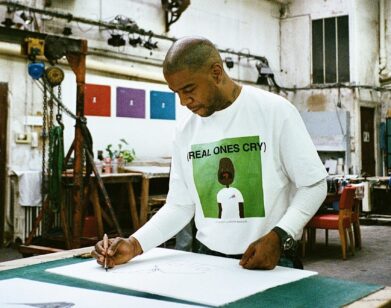Rosecrans Baldwin Meets His Paris Match

ABOVE: ROSECRANS BALDWIN. IMAGE COURTESY OF SUSIE POST-RUST
Paris is a city filled with the magic of the past. When Rosecrans Baldwin, author of the memoir Paris, I Love You but You’re Bringing Me Down (FSG), was growing up in the American suburbs, he imagined a town of wine, romance, cobblestone streets and discrete cafes. Yet, on his quest to capture the cosmopolitan aura he felt Parisians possessed, Baldwin embarks on a drily hilarious journey of discovery that instead points him to les Big Macs, smoking bans, and a Young Jeezy craze. Caught in the advertising world of Paris, fighting to be fluent, Baldwin finds himself writing copy about breastfeeding while living in rickety rooms with his wife—far from the city of lights and love he expected. Though Baldwin pays homage to disillusionment—how our misconceptions can be shattered—he also brilliantly paints a vibrant new Paris, struggling valiantly to reinvent itself through the old. We spoke with Baldwin about French class, Paris as a theme park, David Lynch, why we’re closer to France than we think, and longing.
ROYAL YOUNG: What are our expectations for place versus the reality of a place? Why are they so different?
ROSECRANS BALDWIN: When I went to Paris, I had a lot of ideas about it that were formed in the sort of ether that flows about if you watch too many recent Woody Allen movies, or took French classes as a kid. I was certainly full of those. When I took French class as a kid, they had this video instruction we had to take called Voix et Images de France, “Voices and Images of France,” and there was this young couple called Mireille and Robert and she was this hot blonde and he was this young guy and they just loved each other. So that was there.
YOUNG: So there’s the Woody Allen, baguettes, and busty girls in black-and-white striped shirts. There’s also the Hemingway, Fitzgerald, more writerly image of Paris.
BALDWIN: Yes, Adam Gopnik, when he was writing Letters from Paris in The New Yorker, became a wonderful sort of escape for me. And in many ways also Fitzgerald, and the French authors themselves, like André Gide and Collette.
YOUNG: So the idea of Paris not only became an escape, but a very romantic place, where you could pursue a level of acclaim?
BALDWIN: I never had the idea of moving to Paris and becoming something. I liked the idea of living in Paris because it seemed to have so many parts of life I really enjoyed. The people there seemed to prize literature and art, food and drinking, a more hedonistic way of living. My ambition was to be cosmopolitan. I grew up in the suburbs. I went to college in Maine. I had a dream in my head that if you wanted to be the most urbane, living-life-to-the-fullest kind of person, Paris was the place to be.
YOUNG: Do you still think that?
BALDWIN: Um, yeah, partially. [laughs] I think there’s tons of life and excitement in Paris. You have lots of old people and young people creating sexy new culture, but they’re having to do it in the middle of a theme park. Paris is so dedicated to preserving its sense of itself, “we were great once upon a time,” that it’s hard for people who are making work right now to have to struggle in this sort of museum.
The positive is it’s a city you walk around and you just can’t get away from the ghosts that were there. The negative is that they’ve already done what you want to do, 10 times better.
YOUNG: What did you feel Parisians’ expectations were for you, as an American?
BALDWIN: They’re equally cliché, possibly true, but equally possibly not true at all. Mostly they were surprised that I wasn’t as interested or as knowledgeable about the parts of America they loved. One guy told me about being in a diner in Miami and he just loved the Americana of it. He’s like, “It was totally like it was out of Twin Peaks.” That’s when it clicked to me there’s a good amount of America seen [in] France through David Lynch. All guys are Kyle MacLachlan, all girls are Lara Flynn Boyle, there’s this exotic dimension to America where everyone has muscle cars and big, wide-open plains. There’s a great mystique to the American road, getting in a car and just driving. Though, I think France and America are two countries that have more in common than they do apart.
YOUNG: What are some of those key commonalities?
BALDWIN: I think they are both more outspoken. We’re talking gross stereotypes here, but Americans and French people are more likely to tell you what they believe, why what they believe is right, and how the world should be. Nicholas Sarkozy made the point that both America and France have political systems that they want to share with the world. There’s an emphasis on being a unique person. Screw you if you don’t like it. But the problem is, they’re all the same.
YOUNG: Well, that’s the problem with screaming “unique” so loud.
BALDWIN: Exactly. If you go out tomorrow and get a Koi fish tattoo on your shoulder because you want to be unique, you might not be.
YOUNG: [laughs] Totally.
BALDWIN: [laughs] And there’s no problem with that tattoo! It’s fine.
YOUNG: What was it about you that made you feel like you had to go to France, and get out of this comfort zone of America?
BALDWIN: In college, my wife did a study abroad in Nairobi and I did the exact same program in Cape Town. For me, the experience of being in that other culture really set up a longing. When I’m traveling, things seem really sharp. You learn things ten times faster.
YOUNG: Do you feel like that longing has always been a part of you?
BALDWIN: Yes, it’s a little bit of a restlessness. We’re trying to figure out where we’re going next.
PARIS, I LOVE YOU BUT YOU’RE BRINGING ME DOWN IS OUT TOMORROW.






